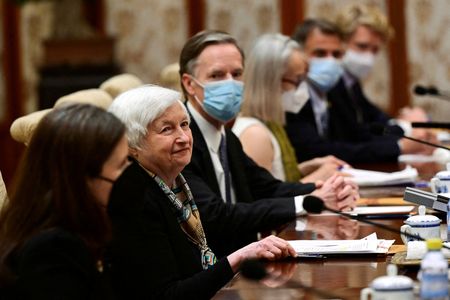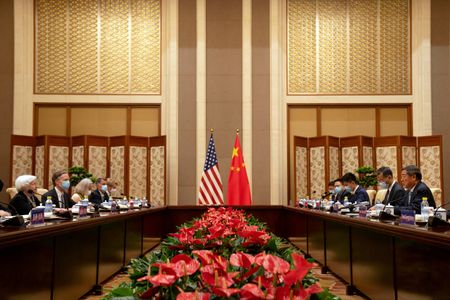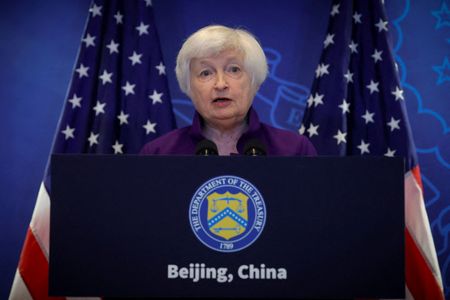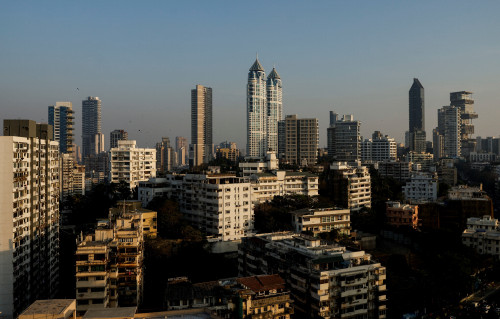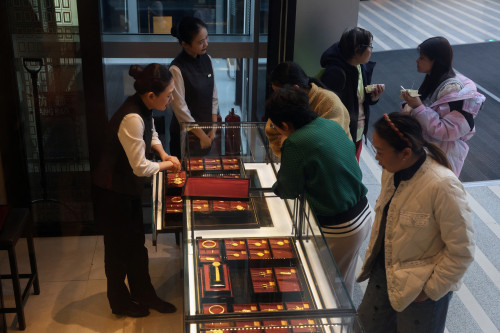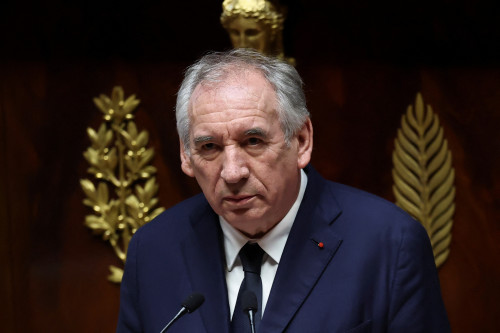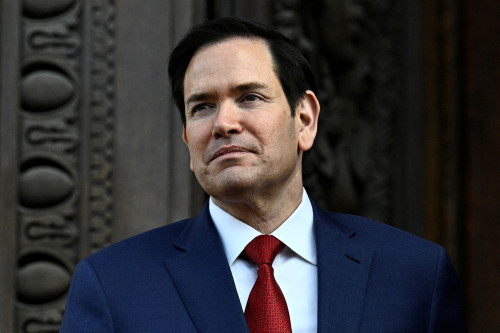By David Lawder and Andrea Shalal
WASHINGTON (Reuters) – U.S. Treasury Secretary Janet Yellen’s trip to China has raised hopes in Beijing that Trump-era tariffs on Chinese imports may be eased as she tries to smooth relations between the two nations, but strong anti-China sentiment in the U.S. may make that impossible.
Trade and political analysts in Washington say that even though cutting some of the “Section 301” tariffs would help U.S. companies and consumers, as well as Chinese exporters, doing so would expose Biden to a buzz-saw of Republican criticism at a dangerous time.
“The political calculus is pretty clear,” said Harry Broadman, a former White House, World Bank and U.S. trade official who is now a managing director with Berkeley Research Group. “That would be red meat for the opposition.”
Looking soft on China could cost Biden the 2024 presidential election, he said, adding that anti-China sentiment in the U.S. in recent years is the highest he’s ever seen, fueled by former President Donald Trump’s China policies.
HIGH HOPES IN CHINA
Yellen discussed trade irritants and other policy differences with China’s top economic officials and Premier Li Qiang for a marathon 10 hours over two days last week — meetings that she said put U.S.-China ties “on surer footing.”
U.S. tariffs and high technology export controls to Beijing’s new anti-espionage law that threatens the activities of U.S. companies in China were among the topics, the U.S. Treasury said. Yellen said nothing publicly to indicate that the U.S. was poised to ease tariffs, but commentators in China were hopeful, amid a U.S. Trade Representative review.
In a statement on Monday, China’s Finance Ministry called for the U.S. to cancel punitive tariffs, roll back export curbs and end import bans from Xinjiang province.
“Yellen has a say in the next phase of the U.S.’s four-year tariff review,” said Hong Hao, chief executive of Grow Investment Group in Hong Kong. “While U.S might continue its technological curbs on China, a reduction or exemption of non-core tariffs against China is possible.”
China’s state-run Global Times, normally a harsh U.S. critic, called Yellen a “professional and pragmatic” official who could influence the Biden administration to take such steps to improve the economic relationship.
Yellen last year advocated eliminating some duties on “non-strategic” goods as a way to ease some specific costs amid high inflation.
But U.S. political pressure to raise China tariffs is growing, said Chad Bown, a trade economist with the Peterson Institute of International Economics who has researched them extensively.
“There is no political appetite to reduce tariffs on China – Secretary Yellen will do well in this political climate if they manage to stay where they are,” Bown said.
U.S. officials have been tight-lipped about any response to the Chinese call for action, noting that no new initiatives were under way. A U.S. Treasury spokesperson declined comment on tariffs.
A USTR spokesperson said the agency was continuing its review and was evaluating feedback received, nearly seven months after it closed public comments.
Collections of U.S. tariffs on Chinese goods peaked at $49 billion in fiscal 2022, bringing the total amount collected from U.S. importers over four years to $182.9 billion, according to U.S. customs data.
U.S. imports from China had nearly reached their 2018 peak in 2022, but are down 24% so far this year.
ENDLESS ‘GROVELING’
Hardliners who dominate China discussions within the U.S. Republican party took to social media memes to mock Yellen for appearing to bow to Chinese vice premier He Lifeng at the start of a meeting.
Firebrand Republican Senator Josh Hawley said in a tweet that such “embarrassing groveling to China is a historic mistake.”
Republican presidential hopefuls have adopted confrontational rhetoric with respect to China, which they see as the nation’s top geopolitical foe.
Florida Governor Ron DeSantis and former UN Ambassador Nikki Haley have laid out the most specific plans so far to confront China on trade, and advocate revoking China’s permanent normal trade relations status, a legal designation granted by the U.S. that lowers trade barriers with specific nations.
Haley has said she would push Congress to revoke China’s trade status until China curbs its alleged role in the fentanyl trade. China is a major producer of chemicals required to create fentanyl, which is frequently smuggled over the U.S.-Mexico border.
Former President Donald Trump, who leads the Republican field with DeSantis a distant second, told Reuters that he would give China 48 hours to remove what sources say is Chinese spy capability on the island of Cuba 90 miles off the U.S. coast. If China fails to comply, his administration would impose new tariffs.
(This story has been refiled to add missing words in paragraph 4)
(Reporting by David Lawder, Andrea Shalal; Additional reporting by Gram Slattery and Jeff Mason. Editing by Heather Timmons and Nick Zieminski)

